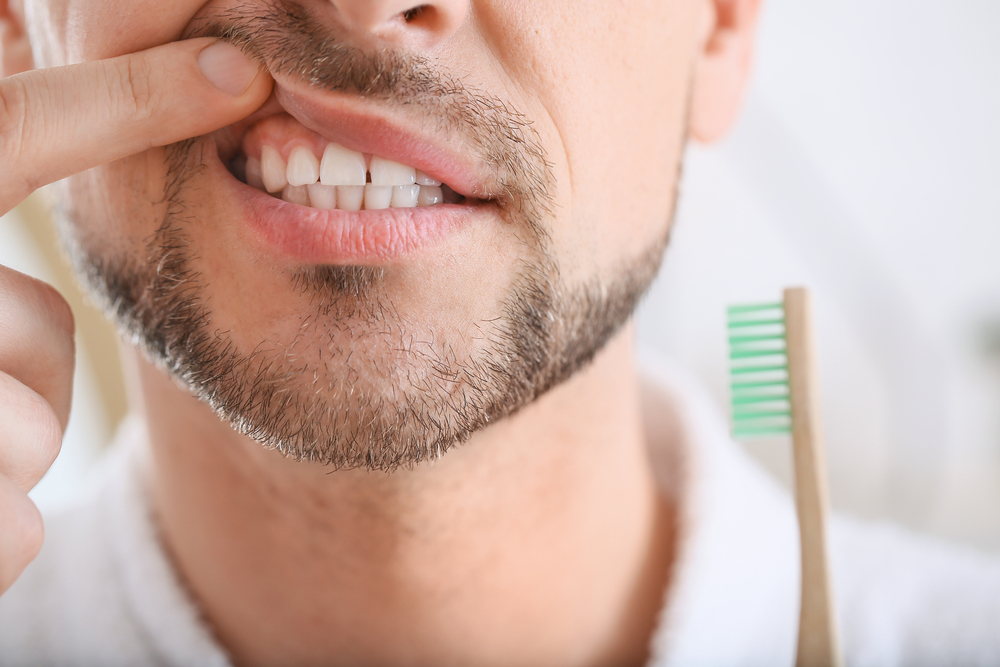Protect Your Oral Health from the Effects of Periodontal Disease
Maintaining optimal oral health is essential for your overall well-being, and preventing gum disease is a significant part of that, as it helps avoid various oral health issues. Gum disease is a common condition that starts with plaque buildup on your teeth and gums. If left untreated, it can lead to severe health issues, including tooth loss and systemic infections.
Union Chapel Dentistry in Fort Wayne, IN, is dedicated to helping you achieve and maintain a healthy smile. Our approach goes beyond just dental treatment; we focus on building lasting relationships based on trust and respect. To schedule a consultation with Dr. David Painter, call us at (260) 232-0280 today.
Understanding Gum Disease

Several risk factors can contribute to the development of gum disease, including poor oral hygiene, smoking, hormonal changes, and certain medications. Regular dental visits and a proactive approach to oral care can help you prevent these issues.
Causes of Gum Disease
Understanding the causes of gum disease is essential for effective prevention. Several factors can contribute to the development of this condition:
- Poor Oral Hygiene: If you don’t brush and floss regularly, plaque can build up on your teeth and gums, leading to gum disease.
- Tobacco Use: Tobacco weakens the immune system and reduces blood flow to the gums, making it harder for your body to fight off infections and heal damaged tissues.
- Genetic Factors: A family history of gum disease can increase your risk, even if you practice good oral hygiene.
- Hormonal Changes: Hormonal changes, such as those experienced during pregnancy, menstruation, or menopause, can make gum tissue more susceptible to gum disease.
- Medications: Certain medications, including antihistamines, blood pressure medications, and antidepressants, can increase your risk of gum disease.
- Health Conditions: Chronic health conditions such as diabetes and certain autoimmune diseases can compromise your immune system and increase the risk of gum infections.
- Poor Nutrition: A diet lacking in essential nutrients, particularly vitamin C, can affect gum health. A balanced diet helps maintain healthy gums and supports oral health.
- Teeth Grinding and Clenching: Excessive teeth grinding and clenching can put additional stress on your gums and teeth, potentially leading to gum damage.
- Tooth Decay: Poor oral hygiene can lead to tooth decay, which, alongside gum disease, represents a serious threat to oral health.



Complications of Untreated Gum Disease
Ignoring gum disease can lead to a host of complications that extend beyond your oral health, impacting your overall well-being. Here are some of the serious issues that can arise if gum disease is left untreated:
- Tooth Loss: As gum disease progresses, the gums can pull away from the teeth, forming pockets that trap bacteria. This can lead to infections that weaken the bone and tissue supporting your teeth, causing them to become loose and eventually fall out.
- Receding Gums: Advanced gum disease can cause your gums to recede, exposing the roots of your teeth. This not only makes your teeth more susceptible to decay but can also lead to increased sensitivity.
- Loose or Sensitive Teeth: The damage caused by gum disease can make your teeth feel loose or overly sensitive, making everyday activities like eating and drinking uncomfortable.
- Abscesses: Bacteria can accumulate in the pockets between your teeth and gums, leading to painful abscesses. These infections can be serious and require prompt treatment.
- Systemic Infections: The bacteria from gum disease can enter your bloodstream, potentially spreading to other parts of your body and causing systemic infections.
- Heart Disease: Research suggests a link between gum disease and heart disease, indicating that untreated gum disease may increase your risk of developing heart conditions.
- Diabetes: Gum disease can make it more challenging to control blood sugar levels, potentially exacerbating diabetes.
- Respiratory Disease: Bacteria from gum disease can be inhaled into the lungs, potentially leading to respiratory infections and diseases.
By addressing gum disease early, you can prevent these complications and maintain both your oral and overall health.
Tips for Preventing Gum Disease
Practice Good Oral Hygiene
The foundation of preventing gum disease is maintaining a thorough oral hygiene routine. Brush your teeth at least twice a day with fluoride toothpaste to remove plaque. Floss daily to clean between your teeth and beneath the gum line. Additionally, using an antibacterial mouthwash can help reduce plaque and bacteria.
Quit Smoking
Smoking is a significant risk factor for gum disease. It weakens your immune system, making it harder for your body to fight infections. Quitting smoking is one of the best steps you can take to improve your oral health and reduce your risk of gum disease.
Limit Sugar Intake
Sugar contributes to the growth of bacteria that cause gum disease. Reducing your intake of sugary foods and drinks helps minimize plaque buildup. Opt for a balanced diet rich in fruits, vegetables, and whole grains to support healthy gums.
Visit Your Dentist Regularly
Regular dental checkups and cleanings are essential for preventing gum disease. Your dentist can identify early signs of gum problems and provide professional cleaning to remove plaque and tartar that brushing alone can’t reach. Scheduling biannual visits to Union Chapel Dentistry can help you stay on top of your oral health.
Use a Water Flosser
A water flosser, like a Waterpik, is an effective tool for removing plaque from between your teeth and along the gum line. It is particularly useful for individuals who have difficulty using traditional floss. Incorporating a water flosser into your oral care routine can enhance your efforts to prevent gum disease.
Manage Stress
Stress can impact your immune system, making it more challenging to fight off infections, including those affecting your gums. Managing stress through relaxation techniques such as deep breathing, meditation, or yoga can support your overall health and oral hygiene.
When to See a Dentist
Regular dental visits are crucial for the prevention and early detection of gum disease. Here are some signs that indicate it’s time to see your dentist:
- Bleeding Gums: If your gums bleed when you brush or floss, it could be an early sign of gum disease. Don’t ignore this symptom, as early intervention can prevent more serious issues.
- Loose or Sensitive Teeth: Teeth that feel loose or are unusually sensitive may be affected by gum disease. It’s important to have these symptoms evaluated by a professional.
Receding Gums: Noticeable gum recession can expose the roots of your teeth, increasing the risk of decay and sensitivity. This is a common sign of advancing gum disease.
- Bad Breath: Persistent bad breath, despite good oral hygiene, can be a sign of gum disease. Bacteria in the mouth can produce unpleasant odors that are difficult to eliminate.
- Pain or Tenderness: Pain or tenderness in your gums or teeth should never be ignored. These symptoms can indicate an underlying issue that needs professional attention.
- Changes in Your Bite: If you notice changes in the way your teeth fit together or in your bite, it could be a sign of gum disease affecting the supporting structures of your teeth.
The American Dental Association recommends that adults visit their dentist for a check-up and cleaning at least twice a year. Regular dental check-ups can help detect gum disease in its early stages, making it easier to treat and prevent complications. Don’t wait for symptoms to worsen—schedule your appointment today to keep your gums healthy and your smile bright.
What Sets Union Chapel Dentistry Apart
At Union Chapel Dentistry, our approach to preventing gum disease extends beyond basic dental care. We emphasize personalized care and education to help you understand and manage your oral health. Dr. David Painter and our team are dedicated to providing you with the tools and support you need to maintain healthy gums and a bright smile.
Safe Sedation Options
For those who experience anxiety about dental visits, Union Chapel Dentistry offers safe sedation options. Dr. Painter holds an Indiana State light-conscious IV sedation permit, allowing us to provide comfortable and relaxed treatment experiences. This ensures that even complex procedures can be performed with minimal stress.
People-Centered Care
Our practice is committed to building lasting relationships with our patients. We take the time to understand your unique needs and concerns, tailoring our recommendations and treatments accordingly. Our goal is to provide high-quality, compassionate care that helps you achieve optimal oral health.
Frequently Asked Questions
Yes, brushing too hard or using a hard-bristled toothbrush can damage gum tissue and lead to gum recession. This can increase your risk of developing gum disease. It’s important to use a soft-bristled toothbrush and brush gently to avoid harming your gums.
While home remedies alone cannot cure gum disease, maintaining good oral hygiene is crucial. Brushing and flossing regularly, using mouthwash, and eating a balanced diet can help manage and prevent the progression of gum disease. Avoiding tobacco products is also important for maintaining healthy gums.
Mouthwash can be a helpful addition to your oral hygiene routine, but it should not replace brushing and flossing. Mouthwash helps kill bacteria and freshen breath, but effective gum disease prevention requires a comprehensive approach that includes regular brushing, flossing, and professional dental cleanings.
Schedule Your Appointment Today
Don’t let gum disease take a toll on your health. At Union Chapel Dentistry in Fort Wayne, IN, we are here to help you prevent and manage gum disease with personalized care and advanced treatment options. Call us at (260) 232-0280 to schedule your appointment.
We also welcome patients from the surrounding areas, including New Haven, Auburn, and Huntington. Take control of your oral health and enjoy a healthy smile for years to come!

 Receding Gums
Receding Gums